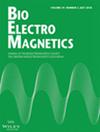Mohammad K. Abhary, Abdullah Akhkha
求助PDF
{"title":"磁化钕对番茄种子萌发及耐盐性的影响","authors":"Mohammad K. Abhary, Abdullah Akhkha","doi":"10.1002/bem.22438","DOIUrl":null,"url":null,"abstract":"<p>Earth's biosphere is surrounded by magnetic fields that affect all living organisms. A plant's response to magnetic fields is displayed in terms of its seed's vigor, growth, and yield. Examining seed germination in such magnetic fields is the first step in the investigation of how magnetic fields might be used to enhance plant growth and maximize crop performance. In this study, salinity-sensitive Super Strain-B tomato seeds were primed with the northern and southern poles of neodymium magnets of 150, 200, and 250 mT. The magneto-primed seeds showed a significant increase in germination rate and speed, where the orientation of the magnet was identified as being crucial for germination rate and the orientation of seeds towards the magnet was shown to affect the germination speed. The primed plants exhibited enhanced growth characteristics, including longer shoots and roots, larger leaf area, more root hairs, higher water content, and more tolerance to salinity levels, up to 200 mM NaCl. All magneto-primed plants showed a significant decrease in chlorophyll content, continuous chlorophyll fluorescence yield (<i>Ft</i>), and quantum yield (<i>QY</i>). The salinity treatments decreased all chlorophyll parameters in control plants, significantly, but did not lower such parameters in magneto-primed tomatoes. The results of this study illustrate the positive effects of neodymium magnet on the growth and development of tomato plants in terms of their germination, growth, and salinity tolerance, and negatively affected the chlorophyll content in tomato leaves. © 2023 Bioelectromagnetics Society.</p>","PeriodicalId":8956,"journal":{"name":"Bioelectromagnetics","volume":"44 1-2","pages":"47-56"},"PeriodicalIF":1.8000,"publicationDate":"2023-02-17","publicationTypes":"Journal Article","fieldsOfStudy":null,"isOpenAccess":false,"openAccessPdf":"","citationCount":"2","resultStr":"{\"title\":\"Effects of neodymium magneto-priming on seed germination and salinity tolerance in tomato\",\"authors\":\"Mohammad K. Abhary, Abdullah Akhkha\",\"doi\":\"10.1002/bem.22438\",\"DOIUrl\":null,\"url\":null,\"abstract\":\"<p>Earth's biosphere is surrounded by magnetic fields that affect all living organisms. A plant's response to magnetic fields is displayed in terms of its seed's vigor, growth, and yield. Examining seed germination in such magnetic fields is the first step in the investigation of how magnetic fields might be used to enhance plant growth and maximize crop performance. In this study, salinity-sensitive Super Strain-B tomato seeds were primed with the northern and southern poles of neodymium magnets of 150, 200, and 250 mT. The magneto-primed seeds showed a significant increase in germination rate and speed, where the orientation of the magnet was identified as being crucial for germination rate and the orientation of seeds towards the magnet was shown to affect the germination speed. The primed plants exhibited enhanced growth characteristics, including longer shoots and roots, larger leaf area, more root hairs, higher water content, and more tolerance to salinity levels, up to 200 mM NaCl. All magneto-primed plants showed a significant decrease in chlorophyll content, continuous chlorophyll fluorescence yield (<i>Ft</i>), and quantum yield (<i>QY</i>). The salinity treatments decreased all chlorophyll parameters in control plants, significantly, but did not lower such parameters in magneto-primed tomatoes. The results of this study illustrate the positive effects of neodymium magnet on the growth and development of tomato plants in terms of their germination, growth, and salinity tolerance, and negatively affected the chlorophyll content in tomato leaves. © 2023 Bioelectromagnetics Society.</p>\",\"PeriodicalId\":8956,\"journal\":{\"name\":\"Bioelectromagnetics\",\"volume\":\"44 1-2\",\"pages\":\"47-56\"},\"PeriodicalIF\":1.8000,\"publicationDate\":\"2023-02-17\",\"publicationTypes\":\"Journal Article\",\"fieldsOfStudy\":null,\"isOpenAccess\":false,\"openAccessPdf\":\"\",\"citationCount\":\"2\",\"resultStr\":null,\"platform\":\"Semanticscholar\",\"paperid\":null,\"PeriodicalName\":\"Bioelectromagnetics\",\"FirstCategoryId\":\"99\",\"ListUrlMain\":\"https://onlinelibrary.wiley.com/doi/10.1002/bem.22438\",\"RegionNum\":3,\"RegionCategory\":\"生物学\",\"ArticlePicture\":[],\"TitleCN\":null,\"AbstractTextCN\":null,\"PMCID\":null,\"EPubDate\":\"\",\"PubModel\":\"\",\"JCR\":\"Q3\",\"JCRName\":\"BIOLOGY\",\"Score\":null,\"Total\":0}","platform":"Semanticscholar","paperid":null,"PeriodicalName":"Bioelectromagnetics","FirstCategoryId":"99","ListUrlMain":"https://onlinelibrary.wiley.com/doi/10.1002/bem.22438","RegionNum":3,"RegionCategory":"生物学","ArticlePicture":[],"TitleCN":null,"AbstractTextCN":null,"PMCID":null,"EPubDate":"","PubModel":"","JCR":"Q3","JCRName":"BIOLOGY","Score":null,"Total":0}
引用次数: 2
引用
批量引用

 求助内容:
求助内容: 应助结果提醒方式:
应助结果提醒方式:


